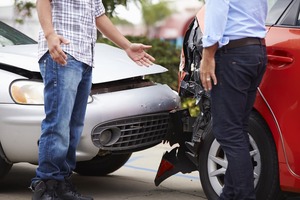
Like most of the 50 states, Georgia is considered an at-fault state for auto accidents. You may be familiar with this term or just hearing it for the first time after recently being involved in a crash.
Either way, you have come to the right place to find the answer to the question, Is Georgia a no-fault state? In this article, our experienced Atlanta car accident lawyers explain how Georgia is an at-fault state, and how it differs from no-fault states.
For a free consultation, please contact us online or call (770) 988-5252 today.
What Is the Difference Between a No-Fault and At-Fault System?
In a no-fault state, your auto insurance policy pays the costs of damages in your car accident up to the policy limits, regardless of which driver is to blame.
You can only seek compensation from the other driver’s insurance carrier under limited circumstances. In other words, in no-fault states, drivers must carry insurance to cover their own injuries and property damage, and their policy would not be required to cover the costs of the other driver’s expenses.
In an at-fault state, you must determine which driver was at fault because their policy will typically pay your damages.
In other words, if another driver is at fault for the collision, you can seek compensation from their insurance company, including reimbursement for medical expenses, repair or replacement of your car, lost wages, and pain and suffering. After establishing fault, you can decide whether to file a claim with your insurance carrier or the other driver’s insurance company.
Is Georgia a No-Fault State for Auto Insurance?
No, most states, including Georgia, are at-fault states. In fact, only 12 states follow a no-fault system, including neighboring Florida.
So Georgia Is an At-Fault State: What Does That Mean?
Typically, one driver is more at fault or more responsible for causing the crash. Typically, when a police officer responds to an auto accident scene, they assign responsibility to one or more parties by issuing traffic citations.
The fact that Georgia is an at-fault state does not mean it is an all-or-nothing situation. Both drivers can share in responsibility for the crash.
Do I Have to Maintain Auto Insurance in Georgia?
Yes, in Georgia, as in most states, all drivers must maintain auto insurance coverage.
This is to ensure they—as well as other drivers they share the road with—are protected in the event of an accident. Auto insurance generally covers the cost of necessary medical treatment and vehicle repair or replacement.
How Much Insurance Does Georgia Require?
All states regulate required minimum insurance coverages, and Georgia is no different.
Under Georgia law, drivers must carry minimum auto insurance as follows:
- Bodily injury liability insurance of at least $25,000 per person;
- Bodily injury liability insurance of at least $50,000 per accident; and
- Property damage (e.g., car repair or replacement) liability insurance of at least $25,000 per accident.
Notably, these minimum insurance policies compensate the other driver if it turns out you are at fault for the accident. Your policy will not reimburse you for your own injuries or repairs to your car. You must have an additional collision policy or medical insurance to cover those costs.
Georgia Comparative Fault Laws
What happens if you are partially at fault for the accident? In Georgia, you can still recover damages even if you are partly responsible for the crash. Georgia law allows for proportional comparative fault, meaning you can still seek compensation for your injuries, but your award will be reduced by the percentage you are deemed at fault.
Practically speaking, this allows for several different scenarios to play out. For instance, one driver might be 100% at fault, both drivers could be equally at fault, or one driver may be the majority at fault, etc.
Example
Here is an example of how comparative fault can play out following a Georgia car accident.
Suppose Joe was driving through an intersection and was hit by a driver who failed to yield before making a right turn. While the other driver certainly seems at fault, it was also determined that Joe was speeding, contributing to the cause of the crash.
It is determined that the other driver is 80% at fault, and Joe is 20% at fault for the collision.
A jury awards Joe $100,000 in damages. He will only receive $80,000 because he was 20% at fault.
Importantly, comparative fault reductions can also take place if the case settles. The insurance company may decrease a settlement offer based on the plaintiff’s percentage of fault.
Seeking Compensation After a Georgia Accident
Generally, there are three ways of seeking reimbursement and compensation for a motor vehicle accident in Georgia:
- File a claim with your insurance company, and they can then go after the liable party’s insurance carrier;
- File a claim directly with the at-fault driver’s policy; or
- File a personal injury civil lawsuit in court.
The right path to compensation can be different for everyone. You should consult an experienced auto accident attorney to discuss your best plan for recourse.
How Do I Prove Fault in a Georgia Car Accident?
There are many ways to prove fault following a Georgia car wreck, some more apparent than others. Typically, the police report issued by the responding officer can provide insight, information, and a general starting point for determining fault.
Police reports can include a handful of information that can help prove fault, including the following:
- A diagram of the accident scene,
- A summary of what happened leading up to and during the crash,
- The location and weather conditions,
- Identifying witnesses,
- The direction the cars were traveling and whether there were any traffic signals,
- Information about traffic citations issued,
- Statements from the drivers and eyewitnesses, and
- The responding officer’s general opinion regarding the cause of the crash and who was responsible.
Some traffic citations can make fault readily apparent. For instance, if the other driver was cited for running the stop sign, it seems clear they are at fault for the crash. However, it can be more challenging to show responsibility when the officer issues no citations—or if they issue minor and less relevant citations for inconsequential things such as a broken tail light.
It can also be challenging to prove at-fault liability when both drivers are partially at fault. Every situation is unique, and proving who is at fault can take investigative work. This is where a seasoned Georgia car accident lawyer can be invaluable in helping you seek the compensation you deserve.
Contact an Experienced Georgia Car Accident Attorney
If you were recently in an accident, you might be wondering how Georgia’s at-fault laws can affect your claim for compensation.
Contact the team at MG Law. We are always available to take your call and answer any questions. At MG Law, we have dedicated our practice to helping accident victims and their families. Reach out online or call (770) 988-5252 today to schedule your free initial consultation.

